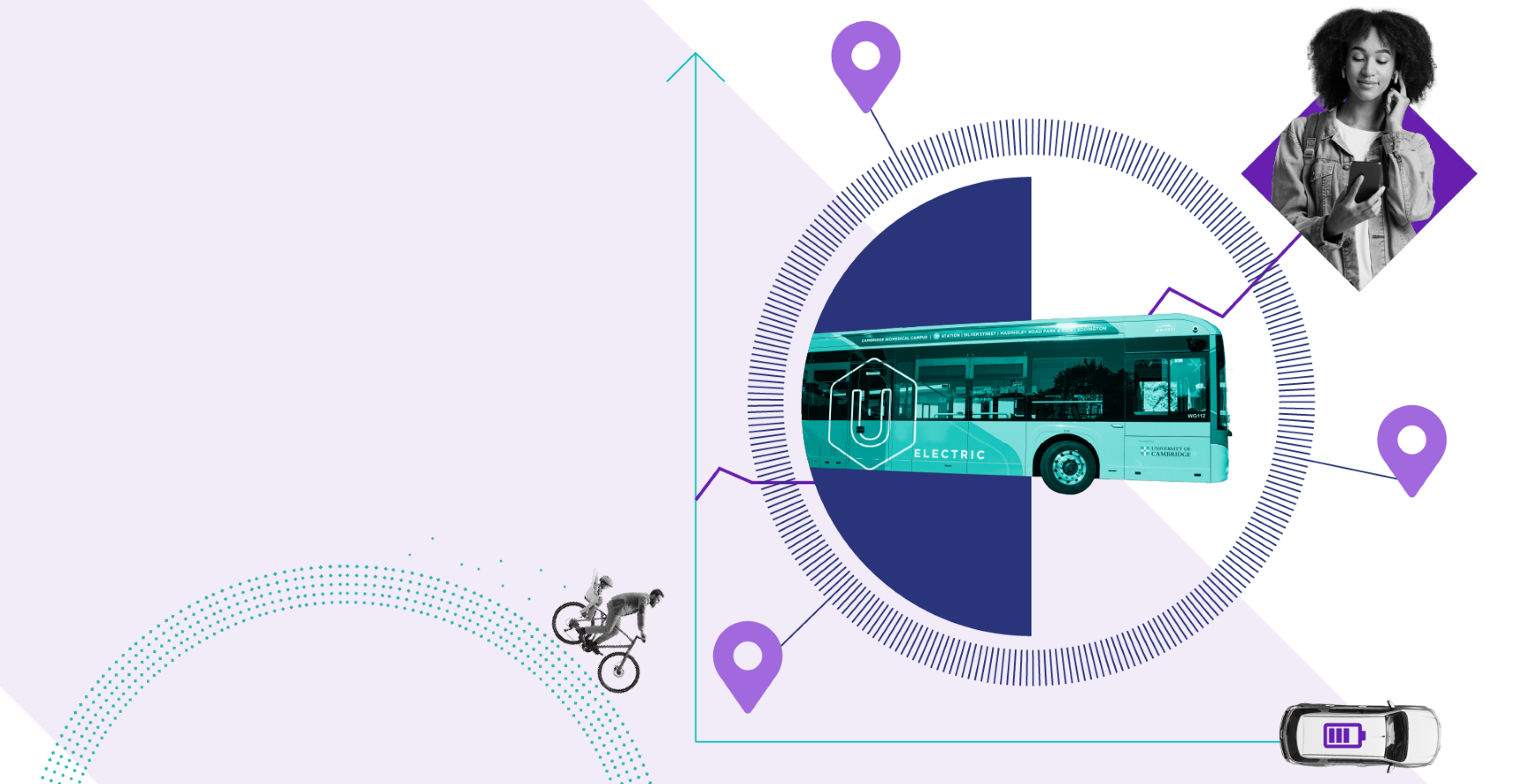Travel and transport

We encourage and support all University members to adopt sustainable travel modes, minimising carbon emissions from staff and student travel to, from, and for work. This helps reduce the University’s impact on traffic congestion and air quality in Cambridge. We will provide convenient, predictable, safe and inclusive travel to our sites.
Our commitments
Our commitment is for 75% of staff to travel to work (commute) by sustainable modes. By ‘sustainable modes’, this means bus, train, cycle, walk, car share, scooter or motorcycle. We provide a range of initiatives to support sustainable transport in and around Cambridge.
We have a target to reduce per capita emissions from business flights by 25% against 2014-15 levels by 2024-25.
More information can be found in our Transport Strategy 2019-24.
Our approach
From cycling schemes to the provision of a high quality subsidised electric bus service, we provide a range of initiatives to support the switch and continued use of sustainable travel modes in and around Cambridge.
Walking, cycling and scooters
We’ve an ongoing programme to upgrade walking and cycling facilities across our estate. To date, we have made improvements to cycle parking at the Downing and Sidgwick sites and installed multiple bike maintenance stations across the estate.
We also offer a range of incentives to support staff cycling and scootering to, and while at, work:
- Try Before You Buy. Staff can test a bike for commuting for up to 2 months, along with other subsidies and payment options.
- Cycle to Work salary sacrifice. Staff can purchase new bikes and equipment up to the value of £6,000 and save on Income Tax and National Insurance.
- University Pool Bikes. Staff can use University managed pool bikes for work related travel across the city.
- Dr Bike. Free maintenance for staff to keep their bikes in safe condition.
- Voi for Business. Staff can access free Day Pass ride credit for Voi scooter rental for so travel during the working day.
- Free lockers are available for staff to store their bikes and equipment in at Park and Ride sites.
Cycle training is also available to all University members who want to improve their confidence on the pedal bike.
Public transport
Rail
Staff can benefit from train discounts of up to 13% on rail season tickets with Greater Anglia and Great Northern.
Bus
Whippet provide the University’s new fully electric Universal Bus Service, linking up our main sites with the city centre, Colleges, railway station, Cambridge Biomedical Campus and Eddington. The buses are fully equipped with air conditioning, USB and wireless charging, reading lights and a digital next-stop announcement screen. Tickets are £1.50 per journey for our staff and students on production of their University ID card. Pre-buying tickets and bus tracking is also available on the Whippet app (App, Tap, Go.).
Live service updates and timetables are available for U1 and U2, a route map from the University Map, and more information from Whippet's Universal Bus page.
Building Travel Plans
We encourage buildings to have their own travel plans in place. We use the Modeshift STARS platform for Travel Plans in Education, Business & Communities.
Electric vehicles
We’re working towards having a fully electric fleet of vehicles by 2030 (part of our commitment to achieving absolute zero scope 1 and scope 2 emissions, see Carbon and energy). Our catering service currently operates a fully electric fleet of vehicles. The Universal Bus service runs a fully electric fleet. We’ve also been increasing the provision of electric bikes, with the University Messenger Service transitioning to a new fleet of electric cargo bikes.
Staff can also benefit from an Electric Vehicle Salary Sacrifice Scheme to support their transition away from fossil fuel powered vehicles. National Insurance savings made from this scheme are used to fund wider sustainable transport initiatives for all staff as listed on this page.
Partnerships
We work with local and regional partners to campaign for improved investment into transport infrastructure and services, as well as helping to shape local projects. These partnerships are crucial for sustainable growth in Cambridge and allow us to fulfil our mission to contribute to society through education, learning and research. For more information about the work we are doing in this area, please visit our Civic and community engagement pages.
Sustainable business travel
To promote climate conscious business travel behaviours amongst staff and students, we have adopted the Guidelines for Sustainable Business Travel. The Guidelines encourage and support a reduction in nonessential University business travel. In particular, they aim to achieve a reduction in the total number of flights and the total distance travelled by air (as opposed to other transport modes) by our staff and students.
We also encourage staff to use the RouteZero Journey Planner to find low-emission journeys whenever travelling. RouteZero was created in conjunction with the Cambridge Institute for Sustainable Leadership (CISL) and includes information relating to the University's all-electric Universal bus route.
Staff can also request advice on alternative travel options available to them through our Travel Advisor Service.
Our progress
Read about our Travel and transport progress.
